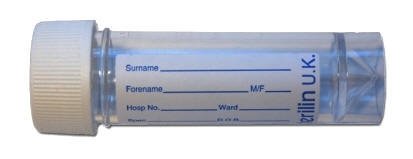White cell enzymes
Chemical Pathology
Notes
- White cell enzyme analysis is indicated when a lysosomal storage disease is suspected clinically.
- Urine glycosaminoglycans (GAG's) provide a screening test for suspected mucopolysaccharidoses.
- Lysosomal enzymes are responsible for the breakdown of large molecules within the cell (glycoproteins, glycolipids, glycosaminoglycans (mucoppolysaccharides)).
- A deficiency of any one of these enzymes leads to an accumulation of the macromolecules within the lysosome and within affected organs i.e. a "storage disease").
- These can be associated with developmental regression, growth failure, corneal or lens clouding, hepatomegaly, splenomegaly, coarsening facial features and skeletal abnormalities.
- White cells are an easily obtainable source of lysosomes, and a range of white cell enzymes or lysosomal enzymes (acid hydrolases) are measured depending on the clinical presentation.
The white cell enzyme screen includes enzyme analysis for the following conditions: Fabry disease, Fucosidosis, a-Mannosidosis, b-Mannosidosis, I-cell disease, metachromatic leucodystrophy, Krabbe leucodystrophy, mucopolysaccharidosis type VII, Sandhoff disease, Tay Sachs disease, Schindler disease, GM1 gangliosidosis, infantile neuronal ceroid lipofuscinosis (CLN1), classic late-infantile neuronal ceroid lipofuscinosis (CLN2) and Nieman-Pick disease types A&B.
Sample requirements
- Samples should be collected early morning Monday to Friday only and sent immediately to the laboratory.
- Samples must reach the laboratory by 12:00h at the latest to ensure timely transfer to the referral laboratory.
For adults and children, 3 - 10 ml of blood taken into a EDTA tube (requires 2 x EDTA tubes).

To screen for suspected mucopolysaccharidoses, a fresh random urine in a 30 mL white top Universal is required.

Storage/transport
Do not store. Samples should be sent immediately to the laboratory at ambient temperature. Do not centrifuge blood.
Required information
Relevant clinical details are crucial to guiding the most appropriate enzyme analysis.
Turnaround times
Samples are sent for analysis to University Hospitals Bristol NHS Foundation Trust with results expected back within 3 weeks.
Reference ranges
Specific enzyme levels are not reported with this screening test, rather an interpretative comment is given.
Please note the screen does NOT EXCLUDE the following: Niemann-Pick C, Cholesterol ester storage disease, other forms of neuronal ceroid lipofuscinosis or Mucopolysaccharidosis disorders types I, II, III, IV & VI.
Further information
To learn more visit UK Metabolic Biochemistry Network or British Inherited Metabolic Disease Group